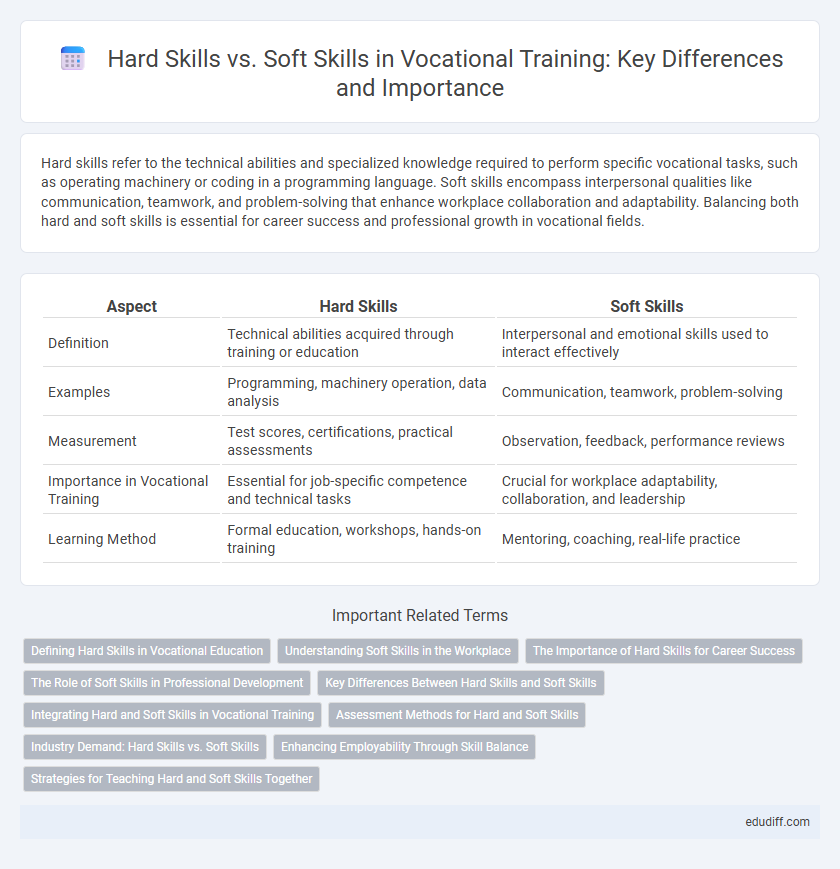Hard skills refer to the technical abilities and specialized knowledge required to perform specific vocational tasks, such as operating machinery or coding in a programming language. Soft skills encompass interpersonal qualities like communication, teamwork, and problem-solving that enhance workplace collaboration and adaptability. Balancing both hard and soft skills is essential for career success and professional growth in vocational fields.
Table of Comparison
| Aspect | Hard Skills | Soft Skills |
|---|---|---|
| Definition | Technical abilities acquired through training or education | Interpersonal and emotional skills used to interact effectively |
| Examples | Programming, machinery operation, data analysis | Communication, teamwork, problem-solving |
| Measurement | Test scores, certifications, practical assessments | Observation, feedback, performance reviews |
| Importance in Vocational Training | Essential for job-specific competence and technical tasks | Crucial for workplace adaptability, collaboration, and leadership |
| Learning Method | Formal education, workshops, hands-on training | Mentoring, coaching, real-life practice |
Defining Hard Skills in Vocational Education
Hard skills in vocational education refer to technical abilities and knowledge specific to a trade or profession, such as operating machinery, coding, or electrical wiring. These skills are measurable, teachable, and often certified through hands-on training and practical assessments. Mastery of hard skills is essential for vocational students to meet industry standards and perform job-specific tasks effectively.
Understanding Soft Skills in the Workplace
Soft skills, including communication, teamwork, and adaptability, are crucial for workplace success and complement technical expertise. Employers increasingly value emotional intelligence and problem-solving abilities, which enhance collaboration and productivity. Investing in developing soft skills leads to improved leadership potential and career advancement in vocational settings.
The Importance of Hard Skills for Career Success
Mastering hard skills such as technical proficiency, data analysis, and specialized certifications directly enhances job performance and employability in vocational careers. Employers prioritize candidates with concrete expertise in tools, software, and industry-specific techniques that drive productivity and innovation. Developing hard skills accelerates career advancement by enabling professionals to meet measurable workplace demands and excel in competitive job markets.
The Role of Soft Skills in Professional Development
Soft skills such as communication, teamwork, and problem-solving significantly enhance professional development by improving workplace interactions and adaptability. These interpersonal abilities complement hard skills, enabling individuals to navigate complex work environments and contribute to organizational success. Employers increasingly prioritize soft skills for leadership potential and long-term career growth within vocational fields.
Key Differences Between Hard Skills and Soft Skills
Hard skills encompass technical abilities and specialized knowledge required for specific vocational tasks, such as coding, machinery operation, or accounting. Soft skills refer to interpersonal attributes like communication, teamwork, and problem-solving that enhance workplace interaction and adaptability. The primary difference lies in hard skills being measurable and teachable, whereas soft skills relate to emotional intelligence and are developed through experience and personal growth.
Integrating Hard and Soft Skills in Vocational Training
Integrating hard and soft skills in vocational training enhances employability and workplace efficiency by combining technical expertise with communication, teamwork, and problem-solving abilities. Vocational programs that blend hands-on technical instruction with interpersonal and cognitive skill development prepare learners for complex, real-world tasks and adapt to dynamic job market demands. Emphasizing both skill sets boosts learner confidence, increases job retention rates, and meets employer expectations for well-rounded professionals.
Assessment Methods for Hard and Soft Skills
Assessment methods for hard skills in vocational training primarily include practical tests, simulations, and technical exams that evaluate specific knowledge and task proficiency. Soft skills are assessed through behavioral interviews, peer reviews, and situational judgment tests that measure communication, teamwork, and problem-solving abilities. Combining both assessment types provides a comprehensive evaluation of a candidate's vocational capabilities.
Industry Demand: Hard Skills vs. Soft Skills
Industry demand highlights that hard skills such as technical proficiency, data analysis, and machinery operation remain critical for immediate job performance in vocational roles. Employers increasingly value soft skills like communication, problem-solving, and teamwork for adaptability and leadership potential within dynamic work environments. Balancing hard and soft skills enhances employability, meeting the evolving needs of sectors like manufacturing, healthcare, and technology.
Enhancing Employability Through Skill Balance
Employers increasingly prioritize candidates who demonstrate a balanced mastery of hard skills, such as technical proficiency and industry-specific knowledge, alongside soft skills like communication, teamwork, and problem-solving. Hard skills ensure efficient task execution, while soft skills foster adaptability and collaboration in dynamic work environments. Cultivating both skill types significantly enhances employability by meeting the comprehensive demands of modern vocational roles.
Strategies for Teaching Hard and Soft Skills Together
Integrating hard and soft skills in vocational training enhances workforce readiness by combining technical proficiency with interpersonal effectiveness. Utilizing project-based learning and collaborative exercises fosters simultaneous development of machinery operation skills and communication abilities. Incorporating real-world scenarios and feedback loops ensures learners apply technical knowledge while adapting to teamwork dynamics, optimizing skill acquisition for professional environments.
Hard Skills vs Soft Skills Infographic

 edudiff.com
edudiff.com